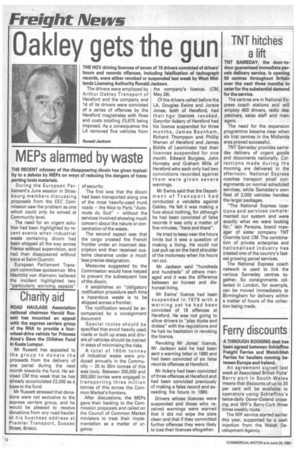MEPs alarmed by waste
Page 14

If you've noticed an error in this article please click here to report it so we can fix it.
THE RECENT odyssey of the disappearing dioxin has given topicality to a debate by MEPs on ways of reducing the dangers of transporting toxic materials.
During the European Parliament's June session in Strasbourg members discussing proposals from the EEC Commission saw the problem as one which could only be solved at Community level.
The need for an urgent solution had been highlighted by recent events when industrial waste containing dioxin had been shipped all the way across France without supervision, and had then disappeared without trace at Saint-Quentin.
European Parliament Transport committee spokesman Mrs Mechtild von Alemann believed the incident highlighted two "particularly worrying aspects" of security.
The first was that the dioxin had been transported along one of the most heavily-used trunk roads — the Nice to Paris "Autoroute du Sud" — without the services involved showing much concern about the nature or concentration of the waste.
The second aspect was that the cargo crossed the French frontier under an incorrect description and then received customs clearance under a much less precise designation.
Measures suggested by the Commission would have helped to prevent the subsequent loss of the dioxin.
It establishes an "obligatory notification procedure each time a hazardous waste is to be shipped across a frontier.
The notification would be accompanied by a consignment document Special routes should be specified that avoid heavily used roads or built up areas and drivers of vehicles should be trained in ways of minimising the risks.
A total of 160m tonnes of industrial waste were produced annually in the Community — 20 to 30m tonnes of this was toxic. Between 200,000 and 300,000 lorries were engaged in transporting three million tonnes of this across the Common Market's frontiers.
After discussions, the MEPs gave their backing to the Commission proposals and called on the Council of Common Market ministers to treat their implementation as a matter of urgency.








































































































